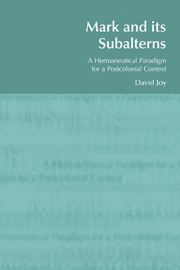Book contents
- Frontmatter
- Contents
- Foreword
- Acknowledgements
- 1 General Introduction
- PART I Hermeneutics: General Methodological Considerations
- 2 Hermeneutics: Indian Methods – Postcolonial Biblical Hermeneutics
- 3 Towards a Postcolonial Biblical Hermeneutics
- PART II Mark – Context and Interpretation
- Endnotes
- References
3 - Towards a Postcolonial Biblical Hermeneutics
from PART I - Hermeneutics: General Methodological Considerations
- Frontmatter
- Contents
- Foreword
- Acknowledgements
- 1 General Introduction
- PART I Hermeneutics: General Methodological Considerations
- 2 Hermeneutics: Indian Methods – Postcolonial Biblical Hermeneutics
- 3 Towards a Postcolonial Biblical Hermeneutics
- PART II Mark – Context and Interpretation
- Endnotes
- References
Summary
Introduction
New methodological shifts and trends in the current world have stimulated and provoked the reader and deconstructed the relationship between the text and reader with a new ideological and political sense. Khiok-khng Yeo argues for the influence and incorporation of cultural values in biblical hermeneutics as “culture, context and people are in constant interaction” (2004: 82). As a result of this movement, postcolonial methods have entered into the fascinating arena of hermeneutics. The presence of the Roman Empire in the Gospel was a major reason for the emergence of the subalterns in Mark. Before moving to the issue of postcolonial readings in biblical studies, it is only appropriate to present fundamental observations on liberation, feminist, postcolonial, and subaltern readings as they have stimulated the biblical hermeneuts to look into various hidden dimensions of the biblical insights which were not given sufficient attention by traditional interpreters of the Bible. In order to examine the above said methods in detail, this study will look at some scholars with a representative character.
Liberation Hermeneutics
It is understood that liberation interpretations, which began in the 1970s as a protest to the existing readings and political dominations, handled many postcolonial concerns in a general manner. A theology of resistance and protest which emerged within the frameworks of military regimes and neocolonialism during the 1960s took the shape of theological and biblical hermeneutics with the publication of Theology of Liberation in 1973 by Gustavo Gutiérrez of Peru.
- Type
- Chapter
- Information
- Mark and its SubalternsA Hermeneutical Paradigm for a Postcolonial Context, pp. 33 - 60Publisher: Acumen PublishingPrint publication year: 2008

